These are not the best of days for we who love movies. The studios, infiltrated by Silicon Valley parasites, are doing to the film industry what they’ve done to every industry: Gutting it, stripping it for parts, getting as rich as they can as fast as they can, and, when at last they’ve squeezed every last drop of blood from every last stone, heading off to the next feeding ground. Do these people care about movies? They do not. They don’t know the first thing about film. Why would they? Why would they care at all?
The writers are on strike, and well they should be. The career of “screenwriter” has been slowly–or not so slowly–destroyed, because if there’s one constant in how the tech mind thinks, it’s that the best way to make money is to stop giving it to other people. As in, employees. The less writers are paid, the more money is left to the execs. Who could say they were wrong? Of course many of these execs are going to be surprised when they find out the first jobs AI is coming for isn’t the writers’, but theirs. After all, what’s a film executive but an algorithm opining on what movies to make next? Who to cast in them? How much to spend? AI is tailor-made to tell us exactly what’s made money in the past, and how, therefore, to continue making money in the future. No humans required but one to read the print-out and ink the deal.
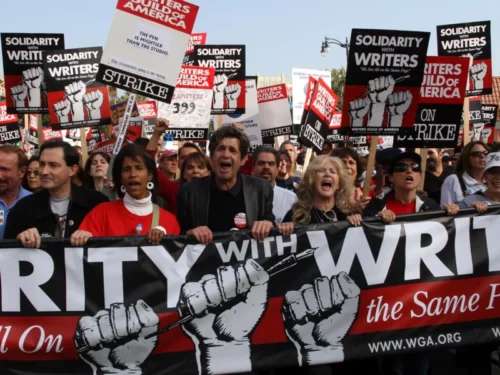
AI represents the apotheosis of the uncreative executive mindset. The goal has long been to make a kind of mathematical sense of art, and thus eliminate risk. That risk is what often brings us the best movies is irrelevant. What’s “best,” after all, but those movies that make the most money? Sure, take a risk on an artist, maybe you get the next Star Wars, or Ghostbusters, or Evil Dead, and, thus, the next “IP” you may for decades afterwards milk for everything it’s worth and plenty it’s not. But more likely you get a dud, some weirdo piece of crap nobody can make sense of, aside from so-called “film lovers.” Much safer to only make what’s already been made. Sequels, remakes, reboots, tie-ins, universes, IPs, and still more IPs. Because when you think about it, what isn’t an IP? Movies, comic books, video games–these are just beginning, the low-hanging fruit. What about candy bars? Handbags? Hamburgers? Gas stations? Shoes?
Air, a new “movie” directed by Ben Affleck, about a shoe and the company what made it, is getting great reviews. Whether or not it makes money is, essentially, unknowable in our streaming era, regardless of Air‘s brief stint in theaters. “Attention” is what Amazon bought it for, and whether or not it gets enough attention to make its price tag worthwhile, only Amazon will tell us.
I put “movie” in quotes because Air isn’t one. It’s an ad for Nike. You love superbowl ads? You’re in luck! This one is two hours long and stars actors you love, as well as starring Ben Affleck.
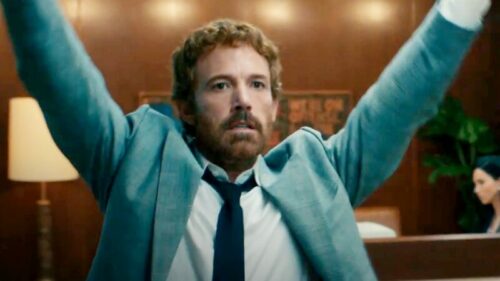
Why even write about this empty, wretched, insufferable piece of garbage, one wonders, especially the one who’s doing the writing? I might have written about so many other movies I’ve watched of late. In only the last month I saw a theatrical screening of Pandora’s Box from 1929, with the Club Foot Orchestra doing their score live. It’s fantastic, with an hypnotic lead performance by Louise Brooks. I watched the ’81 remake of The Postman Always Rings Twice, and was pleasantly stunned at how bad it is, despite its notable cast, director, writer, cinematographer. Think of what could have been written about such a past bomb as that! I watched The Treasure of the Sierra Madre for the first time in years, still magnificent. Re-watched Parasite for the first time since it’s release, probably enjoyed it more this time around. Watched two Suzuki films on the Criterion channel I’d never seen, Eight Hours of Terror and Fighting Elegy, both intriguing, yet neither half as bananas as Youth of the Beast. Saw The Fly from ’58, loved it anew, The Thin Red Line, which I’m always hypnotized by, and speaking of which, Badlands, a movie I was cool on ages ago but now find to be brilliant, and, on 35mm, The Masque of the Red Death, one of Roger Corman’s finest directorial efforts.
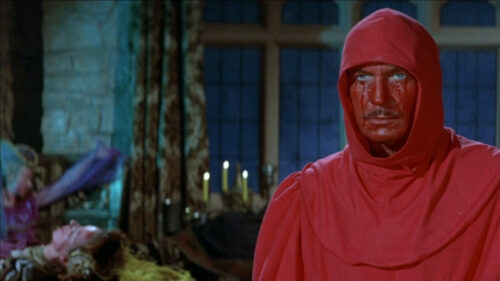
So there’s been no shortage of movies to write about. There’s only been too much life, and not enough time to opine on the history of cinema.
Air, then. I figured it would outrage me out of my torpor. I was right. It feels more immediate. More of the moment. More representative of the movie hellscape now burning Hollywood to the ground. The picket lines are thinning. Younger writers imagine this’ll be over in a week or two. Older writers, knowing a bit about the written word and the studios besides, see the writing on the wall. It’s going to be a long wait before a deal is struck. And what kind of deal will it be? One shudders to think.
In the meantime, we get products like Air. With a budget of $90 million, it’s said, then bought by Amazon for $130 million. Wait, $90 million? To make a movie set almost entirely in offices? Where did they spend all of that–Oh, right. They spent it on five actors and one director. What were Matt Damon, Viola Davis, Jason Bateman, Chris Tucker, and Affleck paid? $10 million each? $20? $30? Somewhere in there. Hell, who wouldn’t act in a Nike ad for that kind of money?
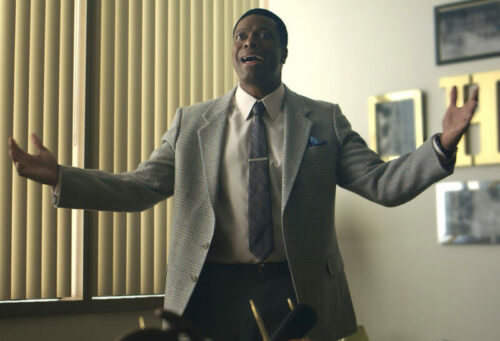
This, then, is today’s film industry. Players with names demand extreme budgets to make junk, spend a quarter of it on the junk itself, and pocket the rest. Revenue is a mystery, since the value of anything streamed is measured via occult methodologies unrelated to numerical earnings, and yet the studios and execs still rake in record profits for their shareholders, while simultaneously expressing outrage and dismay that the people writing their content want another half a percent of profits and a shot at something other than a temp gig.
Air is an embarassment. When I first saw the trailer, I thought it was a gag, then remembered it had been decades since Saturday Night Live had produced anything so biting and hilarious. The actual movie is worse for being far longer and not nearly as funny. It tells the uplifting story of a guy at a company who has the genuis idea of signing the next big basketball star to wear that company’s shoes. Inspiring stuff!
Maybe I haven’t broken it down enough for you to really feel the drama. See, Nike, back in those days–Sorry, which days? 1984. Don’t remember it/weren’t alive then? No problem, Affleck has you covered. The movie opens with a sort of VH1 montage of all things ’80s, commerials, movies, TV shows, music. Plus throughout the movie he cuts away with the regularity of a metronome to shots of ’80s products, posters, clothes, and any other signifier he can think of. The soundtrack borrows from Beverly Hills Cop and who can even keep track of what else, though I did notice the Tangerine Dream cue stolen from Miracle Mile, which to my mind is inexcusable. Leave great movies alone, Affleck! Get your own movie music, ya thief!
So it’s ’84, and Nike, despite being a massive, wealthy shoe empire, only has a paltry 17% of the basketball shoe market, and… and… Sorry, I nodded off for a minute there. Where was I? Right, basketball shoe market, a whole other world, folks, and the only money Nike has to spend on signing three, maybe four new NBA draftees, is 250K. And the cool players all want cool Adidas and Converse shoes. But then this one guy, Sonny (Damon), who resembles not in the least his historical counterpart (should you make the mistake of watching this Nike ad, go here to read about how most of it is completely made up bullshit), has this amazing idea: What if they use that 250K to sign just one player, only they sign the most awesome one? Who he knows is Michael Jordan? WHOA.
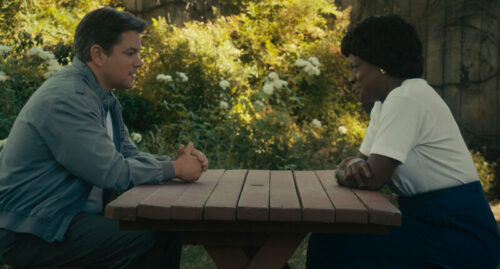
Everyone tells him he’s nuts, including CEO Phil Knight (Affleck). Why would someone awesome even want to be signed by Nike? Sonny has another genius idea. They’ll design the whole shoe around Jordan! Granted, it’s not really his idea. He sees an ad on TV with Arthur Ashe selling personalized tennis rackets. So it’s someone else’s genius idea.
Anyway, more than an hour of screen time is spent in offices with people telling Sonny how crazy his idea is. At last he gets a meeting with Jordan and his parents (Viola Davis and Julius Tennon), gives a ludicrous speech, and signs Jordan. Who turns out actually is a great basketball player! And the shoes sell billions! So many people get so rich, I swear you’ll be weeping tears of joy when it ends. All that money. MONEYMONEYMONEY!
Only now imagine Sonny’s plan hadn’t worked. Nightmare, right? Nike would merely be a massively wealthy running shoe company, with a basketball division that maybe, possibly, would not exist after awhile, unless it did. And Sonny? He very probably would have had to get a job at another shoe company. FUCK. It’s tearing me up just writing this. And how about Jordan himself? Can you imagine? Jesus, he’d be wearing some other company’s shoes, and they’d be raking in billions. Jordan’s own billions would be coming from a different shoe company!
So those are, to use screenwriting lingo, the “stakes” of this two hour shoe advertisement. Will a man keep his job, and not have to get another one? And will one company make billions off Michael Jordan’s talent, or will another? You can really feel the passion burning in this one, the artistic need to make this film, to really say something about the world. And even in the context of the ad itself, the stakes make no sense. For over an hour of screen time everyone tells Sonny he’ll destroy the basketball division with his plan. It’s madness! Only… the plan is just to try and sign Jordan. Which Sonny is also told will never happen. So… if they failed to sign Jordan, they’d still have their 250K. They’d still just go back to the old plan and sign three other, seemingly lesser lights.
It’s almost as if there’s no drama whatsoever in this story, and that anything resembling drama is made up. Which, again, same link as above, it is.
What’s especially depressing about a “movie” like Air is its critical reception. It’s being treated as a movie. It has an alarmingly high score at the tomato site. The feedback, then, for the AI bots and they who own them, is clear. This sort of product, this ad, is what people want more of. I imagine they’ll be getting it. A lot of it. Boxes and boxes of it, delivered to their doors by the AIs who’ve crunched the numbers and made it so.
As for the writers, it’s not looking great. They’re still needed, so far. But surely they’ll come around to working for less. They always do. After all, what could be more glamorous than writing scripts in Hollywood?
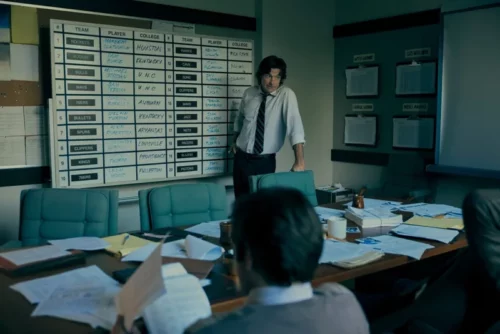

But is BlackBerry worth watching?
I can’t wait to watch Air Ball, the Lucrative Story of the Making of Air.